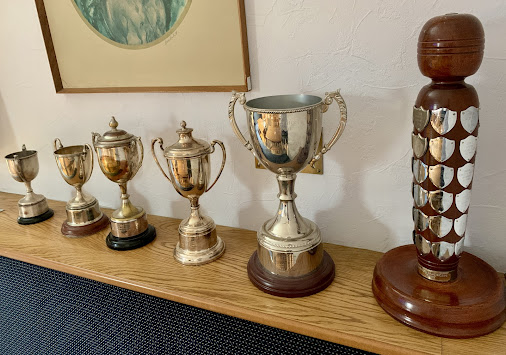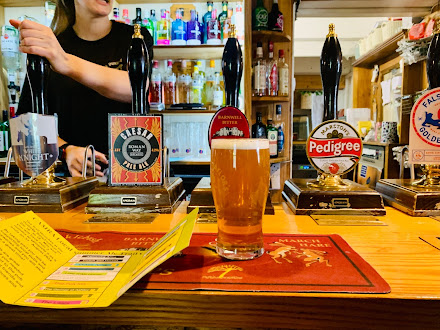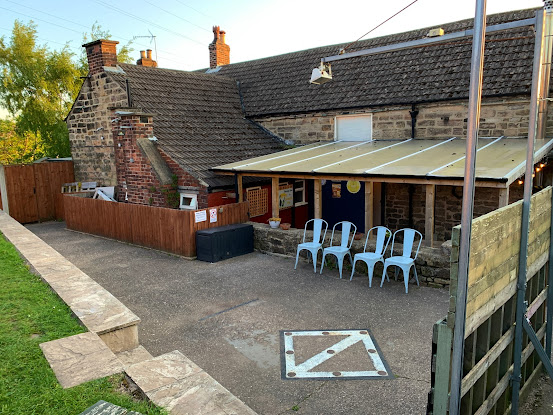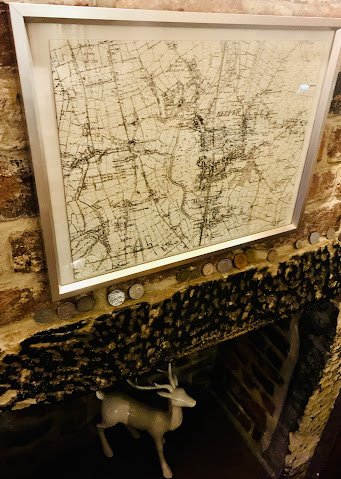Barrow Upon Soar in Leicestershire's Soar Valley is probably best known for the impressive Plesiosaur fossil that was discovered by workmen digging a Lime Pit in 1851, the original, now catchily renamed Rhomaleosaurus Megacephalus, resides in Leicester's New Walk Museum. Villagers are clearly proud of their fossil, examples of which are reproduced all over the village (above) as part of a Fossil Trail that I didn't have time to explore. I suspect this may be the only thing Barrow is truly famous for, although it's position on the navigable River Soar is how many outsiders will have come across the village, and the extensive Lime Works are a notable landmark when viewed from the Midland Mainline between Leicester and Loughborough.
There is of course
much more to Barrow than ancient aquatic fossils. The pubs of the village for example, of which there are a fair few. In fact Barrow Upon Soar strikes me as being a relatively small village that's slightly over-pubbed! Not that I believe anywhere can truly be over-pubbed if the locals are keen to use them, so let’s rephrase that as 'blessed' with good number of pubs and clubs, most of which I found to be very good indeed on a recent visit to the village.
So Barrow is a village that makes for a great afternoon pub crawl destination, even more so if you're up for the short walk across the River Soar floodplain (do check the tides first!) to explore the clutch of pubs in nearby Quorndon (renamed Quorn in 1889). Quorn village also opens up the possibility of a ride on the Great Central Railway, a preserved heritage rail line that runs from Loughborough, through beautiful Charnwood countryside to Birstall on the outskirts of Leicester.
We might expect that a Leicestershire village as comprehensively pubbed as Barrow would be a happy hunting ground for traditional pub games, indeed the
Soar Valley area remains one of the strongholds of Leicestershire's unique version of Alley Skittles. In fact Barrow itself has only two alleys as far as I can tell, of which only one is in regular use for competition, the
Working Men's Club in nearby
Sileby being the only other venue for league play within walking distance. The fact is that many of the pubs and clubs in the area have lost their skittle alleys, the
Blue Bell in
Rothley converting theirs to a restaurant as recently as 2014 for example.
As it happens it would have been around 10 years ago that I last explored the village, penning a piece on skittles at the
Soar Bridge Inn which is now probably Barrow's last remaining pub with an alley for the local game of
Long Alley Skittles. Whether it gets much use for the game these days is hard to say, the pub doesn't seem to field a team in the local league anymore so perhaps it's more of a social venue now.
So for league play we must go to the nearby
Barrow Conservative Club, which should be no great hardship whatever your political persuasion given that in common with almost every club I've been to in recent years it's impeccably run, and with a decent local pint and quality snacks too, though more particularly the kind of filled
Cobs the East Midlands is rightly famous for.
It's at places like the Conservative Club that traditional pub games not only survive, but in many cases truly thrive. Cribbage, Darts, Dominoes, Skittles, and Snooker are all played at the club, Quiz Nights, Bands and Bingo keeping the non-gamers entertained.
Tucked away off North Street, some might say the club is appropriately located given that the building, whilst certainly tidy enough, is in truth not much to look at from the outside. I was keen to get a photo but I just couldn't find an angle that made it look anything more than it is, a modern red brick affair with a separate, and if anything slightly more attractive
Skittle Alley/
Function Room. So, somewhat plain and functional on the outside, but warm and welcoming within.
The Conservative Club Skittle Alley occupies space in a sizeable function room, the ‘
Frame’ for the skittle pins a pockmarked steel plate set into the wooden flooring (
right). This setup is increasingly popular for a game that would originally have been played outdoors (as it still is at some venues for the game in
Derbyshire and
Nottinghamshire), or at best in a draughty outhouse of the pub. Comfort is more of a concern now, particularly for leagues that play through the Winter months, as here. Given the robust nature of a game where barrel shaped '
Cheeses' are hurled through the air rather than rolled along the surface, it surprises me that these indoor alleys don't suffer more damage, testament to the skills and accuracy of the players I'm sure.
Whenever I investigate Long Alley Skittles in Leicestershire it's almost always the
Syston & District Skittles League that comes up. There's not much to be found about the history of the league online, sadly there rarely is for pub games leagues, but it's certainly been around for at least the best part of a century. Indeed I have a medal for the 1944/45 season of what was then called the
Syston Skittles League (
left). The much reduced 'District' league of today extends as far as
Melton Mowbray in one direction,
Barrow and
Sileby in the other, with competition down to just one division of ten teams. This encompasses several
Cup Competitions and numerous trophies for outstanding performance, such as Highest Individual Score. Reduced it may be, but the league is also a proud supporter of the local LOROS Hospice through generous donations from its membership.





















































